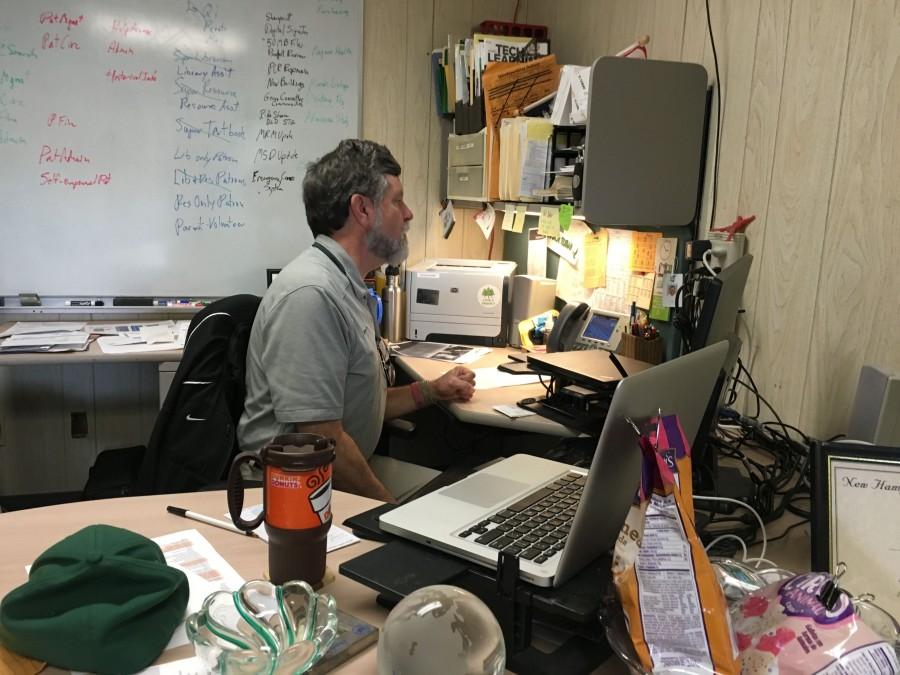Upper school and middle school faculty at risk of virus on Windows computers
Director of Information Technology Services and Support Dan Hudkins leads a conference call early this morning with the school’s Network Manager, Technology Services Manager, System Administrators, and the Technology Services team to come up with a strategy for how to tackle the virus. It is unclear when it will be safe to use Windows computers again.
March 15, 2016
A computer virus attacked upper school network computers this morning, causing the computer people to notify Harker faculty using PC computers to immediately shut down their computers.
The crypto locker virus, a ransomware virus first detected in 2013, targets Windows computers through email attachments. Once downloaded, the virus encrypts all files on the computer applying a password to decrypt the files. In order to get the password, infected users must pay a ransom in order to reclaim and decrypt their files.
The IT Department has verified that only data from Monday is possibly at risk as their last safe backup took place Sunday night. The backup has been now taken offline to prevent further infection.
According to Director of Information Technology Service and Support Dan Hudkins, this cryptolocker virus is transmitted through an email attached with zipped files that look like PDF files. Once clicked, the infection is launched. An infected machine then has the potential to infect all other folders if that specific user is connected to a share on a file server that will also become infected.
Student laptops have not been infected since students have been isolated off the internal network in caution of their lack of knowledge to check for viruses. Faculty are still advised not to use their Windows computers until further notice.
The IT department has deployed resources to figure out exactly what variant of this virus has occurred so they know how to further deal with the situation and bring things back online.
“If we identify the variant, we can be certain that is not one of the ones that propagates from client to client,” he said. “In other words, it jumps from one machine to another machine without talking to a server. If we are sure that those two things are not true, then we should be able to start bringing on machines fairly soon. If we can’t identify that to a certainty then I have a hard decision to make.”
Here is how to prevent cryptolocker if the machine has already not been infected:
– Be careful with emails from senders you are unaware of, especially if there is an attached file
– Disable hidden file extensions in Windows
– Backup all your files
– If you have not already backed up your files and your machine has been infected, do not pay the ransom.


















![“[Building nerf blasters] became this outlet of creativity for me that hasn't been matched by anything else. The process [of] making a build complete to your desire is such a painstakingly difficult process, but I've had to learn from [the skills needed from] soldering to proper painting. There's so many different options for everything, if you think about it, it exists. The best part is [that] if it doesn't exist, you can build it yourself," Ishaan Parate said.](https://harkeraquila.com/wp-content/uploads/2022/08/DSC_8149-900x604.jpg)




![“When I came into high school, I was ready to be a follower. But DECA was a game changer for me. It helped me overcome my fear of public speaking, and it's played such a major role in who I've become today. To be able to successfully lead a chapter of 150 students, an officer team and be one of the upperclassmen I once really admired is something I'm [really] proud of,” Anvitha Tummala ('21) said.](https://harkeraquila.com/wp-content/uploads/2021/07/Screen-Shot-2021-07-25-at-9.50.05-AM-900x594.png)







![“I think getting up in the morning and having a sense of purpose [is exciting]. I think without a certain amount of drive, life is kind of obsolete and mundane, and I think having that every single day is what makes each day unique and kind of makes life exciting,” Neymika Jain (12) said.](https://harkeraquila.com/wp-content/uploads/2017/06/Screen-Shot-2017-06-03-at-4.54.16-PM.png)








![“My slogan is ‘slow feet, don’t eat, and I’m hungry.’ You need to run fast to get where you are–you aren't going to get those championships if you aren't fast,” Angel Cervantes (12) said. “I want to do well in school on my tests and in track and win championships for my team. I live by that, [and] I can do that anywhere: in the classroom or on the field.”](https://harkeraquila.com/wp-content/uploads/2018/06/DSC5146-900x601.jpg)
![“[Volleyball has] taught me how to fall correctly, and another thing it taught is that you don’t have to be the best at something to be good at it. If you just hit the ball in a smart way, then it still scores points and you’re good at it. You could be a background player and still make a much bigger impact on the team than you would think,” Anya Gert (’20) said.](https://harkeraquila.com/wp-content/uploads/2020/06/AnnaGert_JinTuan_HoHPhotoEdited-600x900.jpeg)

![“I'm not nearly there yet, but [my confidence has] definitely been getting better since I was pretty shy and timid coming into Harker my freshman year. I know that there's a lot of people that are really confident in what they do, and I really admire them. Everyone's so driven and that has really pushed me to kind of try to find my own place in high school and be more confident,” Alyssa Huang (’20) said.](https://harkeraquila.com/wp-content/uploads/2020/06/AlyssaHuang_EmilyChen_HoHPhoto-900x749.jpeg)







